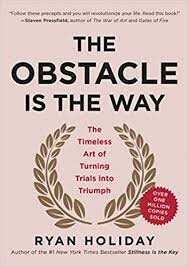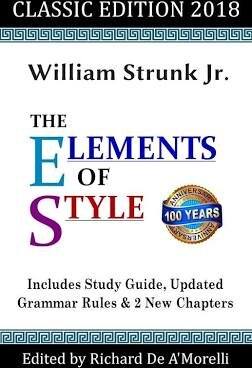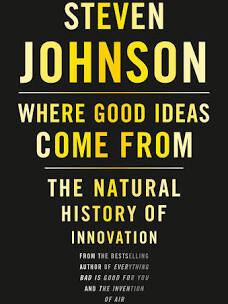Books that changed me in 2020.
I met a guy last year who was in the midst of moving his family to Dubai— a big, life-altering decision.
When my wife asked him what inspired them to make such a big change, he mentioned a book; Don’t Waste Your Life, by John Piper.
That book is now on my bookshelf, and I’m terrified to read it.
Reading changes us.
Every day we read piles of Facebook comments, news articles, and other bits and pieces of text that live on the internet. They all have the power to change us, and they do.
Books are bigger, though. Books take intention.
With intention, you can change in directions you want to change — not just in the direction the algorithms dictate.
*
When I was a kid, on Friday night, we’d pile into the car and drive twenty minutes into town to walk through rows of VHS tapes in search of a movie we might like. Then we’d drive home, make popcorn, and watch the movie as a family.
Now, Netflix starts playing a movie for me if I don’t manage to flip to another thumbnail fast enough. It can be really easy to passively consume content.
In 2020, I wanted to dig in a little more. I wanted to get better at writing, and I wanted to take in some older ideas. Ideas that don’t usually float by on my social media newsfeeds.
I’m going to share those books with you now, and some brief reflections on them now that they’ve percolated.
A few notes, first:
1. I don’t like saying I’ve read a book unless I’ve read it from cover to cover. The below books are cover-to-cover reads, I think. There were some other books I picked up and didn’t finish. Maybe I will someday.
2. I think there are different parts of my brain at work when I read a book than when I listen to one. I like to specify if I’ve listened to it, or read it.
3. They aren’t in any particular order. I do mention that Man’s Search for Meaning is the book I would choose from the list as the one everybody should read.
Here we go!
Books I read with my eyes
The Obstacle is the Way, by Ryan Holiday
Over 2000 years ago, Marcus Aurelius wrote in his book Meditations: “The mind adapts and converts to its own purposes the obstacle to our acting. The impediment to action advances action. What stands in the way becomes the way.” Holiday brings this concept into the modern world and gives us all a good introduction to stoicism.
On Writing; a Memoir of the Craft by Stephen King.
This is the first book I’ve read by Stephen King, and it was fantastic — I enjoyed every page. King shares ridiculous stories from his past, and quietly weaves in lessons about writing. By the time I reached the end, I felt like I personally knew Stephen King, and I knew a thing or two more about writing as well.
The Elements of Style, by William Strunk Jr.
If you’re the kind of person who loves details and specifics, you might enjoy this technical booklet. I only read it because it was recommended by Stephen King and a couple of the other writers in this list of books.
The War of Art, by Stephen Pressfield
The difference between professionals and amateurs is that professionals go to work whether they’re inspired or not. This short read from Stephen Pressfield made me an instant fan of his thinking and writing.
On Writing Well, by William Zinsser
With William Zinsser, you get the feeling you’re sitting and listening to an elderly mentor walk you through foundational principles of writing. I can feel his hand on my shoulder as I write this now.
Writing Tools, by Roy Peter Clark
While Stephen King’s On Writing was my favourite to read, Writing Tools was hands down the most practical book for improving writing. 55 chapters; 55 tools.
I’ll share tool number 22 with you here: climb up and down the ladder of abstraction.
At the bottom of the ladder, you’ll find toothpicks, sd cards, and coffee mugs. At the top, you’ll find your destiny, transcendence, and heartfelt apologies. The idea is to move up and down the ladder in your writing, to keep the reader engaged. Don’t hang around for too long in the boring world of concrete realism, but also be careful to not get lost in the clouds of ambiguity. Use both worlds to the benefit of your writing.
Start Writing Your Book Today, by Morgan Gist MacDonald
There were some good ideas in this book. Particularly the idea of a reverse outline. If you’ve written your book, but you’re struggling to see the big picture, you can work through it by creating line-by-line summaries of each paragraph to help you see the content from a 30k foot view.
Successful Self Publishing, by Joanna Penn
This is another technical book that I’ll likely return to once I’ve got the first draft of my book finished. Joanna Penn has a great podcast for writers called The Creative Penn.
Books I read with my ears
Where Good Ideas Come From, the natural history of innovation, by Steven Johnson
This book was intriguing. Steven Johnson has a journalistic approach to his writing, opening each chapter with a colourful story followed by a concept about creativity. He digs back into history and draws out interesting conclusions.
Man’s Search for Meaning, by Victor Frankl
Of all the books I read in 2020, Man’s Search for Meaning is the one every person should read. Victor Frankl survived 6 years in Nazi concentration camps and held the unique perspective of a professional psychoanalyst. The first half of the book is a memoir with both horrific and beautiful insights into discovering purpose when the world seems void of meaning. The second half digs deeper into his philosophies. While Nietsche believed it’s man’s lust for power that drives his behaviour, and Freud believed it’s man’s search for pleasure –– Frankl believed it’s man’s search for meaning that ultimately drives his behaviour.
If you read only one book on this list, read Man’s Search for Meaning.
Mindset, by Dr. Carol S. Dweck
Dr Dweck made a revolutionary discovery in what she came to call “ the fixed mindset and the growth mindset.” In a fixed mindset, a person believes talent and ability are innate –– you either have it, or you don’t. Sure, you can improve a little with focused energy –– but not much. With a growth mindset, on the other hand, a person believes they can dramatically improve their skills and abilities in anything if they put in the effort.
The crazy part is that in their studies, Dweck and her team were able to give participants a particular mindset. They would tell one group that their ability in the task they were about to perform was innate, and they’d inform the other group that they could improve drastically. Guess who performed better.
It turns out you can have a growth mindset in some areas of your life, and a fixed mindset in others. The book helped me see where I needed to remind myself to have a growth mindset.
If you enjoy psychology and want to find new ways to face obstacles in your life, this book might open your eyes.
The Gulag Archipelago, by Alexandr Solzhenitsyn
I get the feeling a very large portion of dystopian fiction could be traced back to true stories from the Gulag.
Going into this book I had very little understanding of Russian history. I had heard that Stalin was responsible for killing his own people –– but did not know how or why. The horrors of communist Russia and the depths of control and evil that mankind is capable of are mindbending. There were also incredible stories of strength and humanity in the midst of it, but not as much as you’d see in Hollywood depiction.
I had a bunch of painting to do around the house and managed to listen to the entire 21-hour book. It was heavy but meaningful. These kinds of historical insights should be widely read and talked about to keep us engaged, alert, and appreciative for the freedom we experience.
Notes from the Underground, by Fyodor Dostoevsky
A philosophical bath in nihilism. Intellectualism can get very dark when left alone to perpetually lick its wounds and grow its fantasies. Written like a memoir, this fictional book felt very, very real.
The Pursuit of God, A.W. Tozer
This was a well-timed book. I’ve struggled at times with the habitual practice of church-attendance and what it means to be a Christian. A.W. Tozer paints a beautiful reminder of the importance of nurturing an inner life of prayer and worship of God through Jesus Christ.














